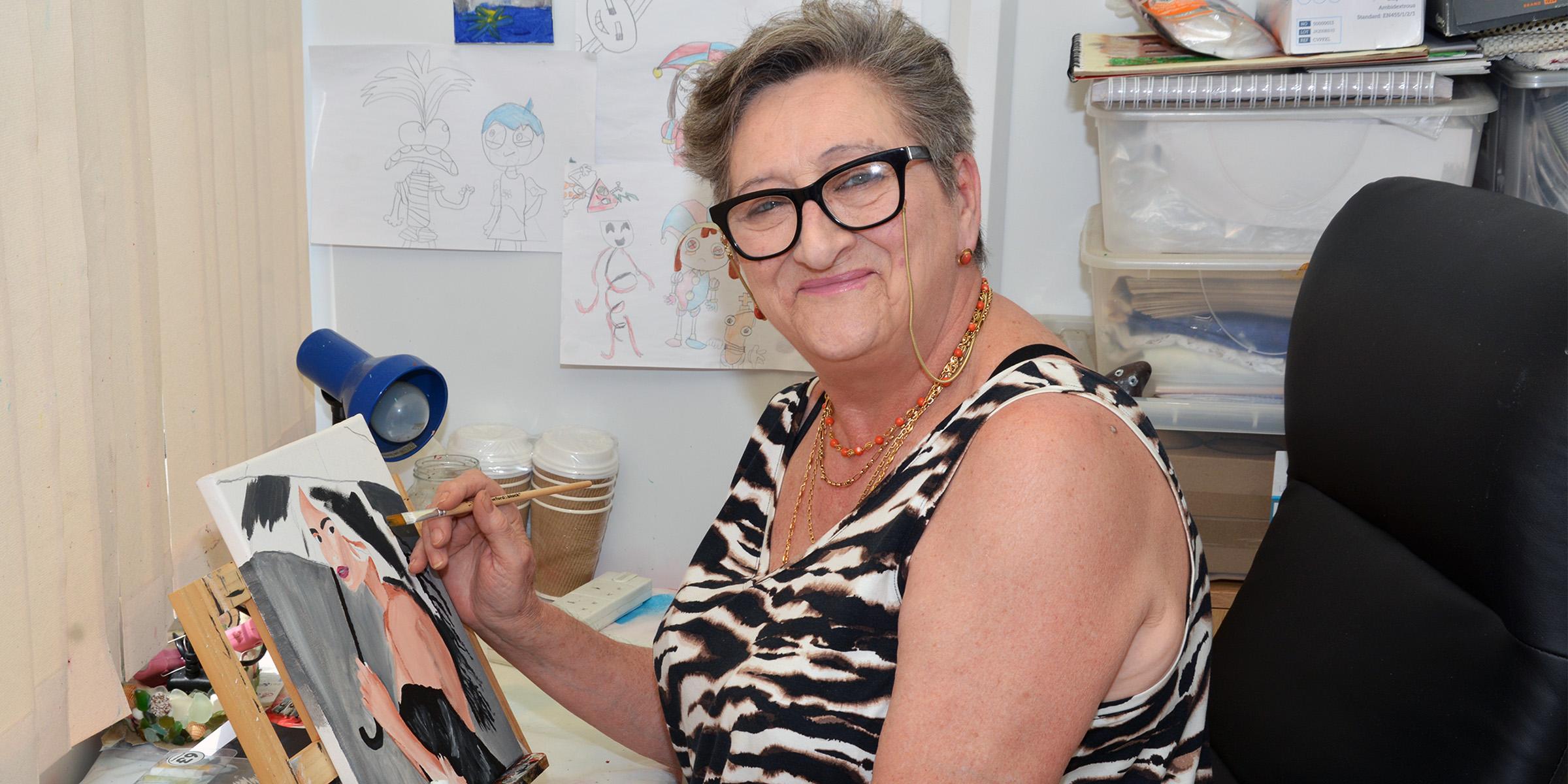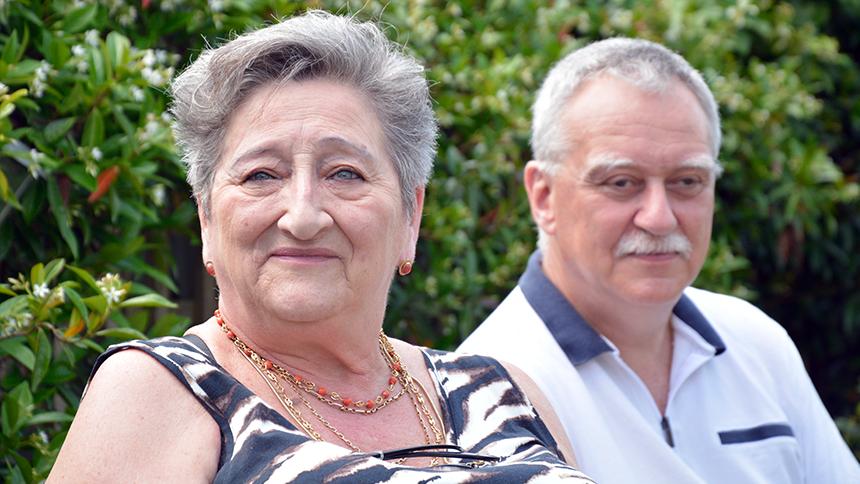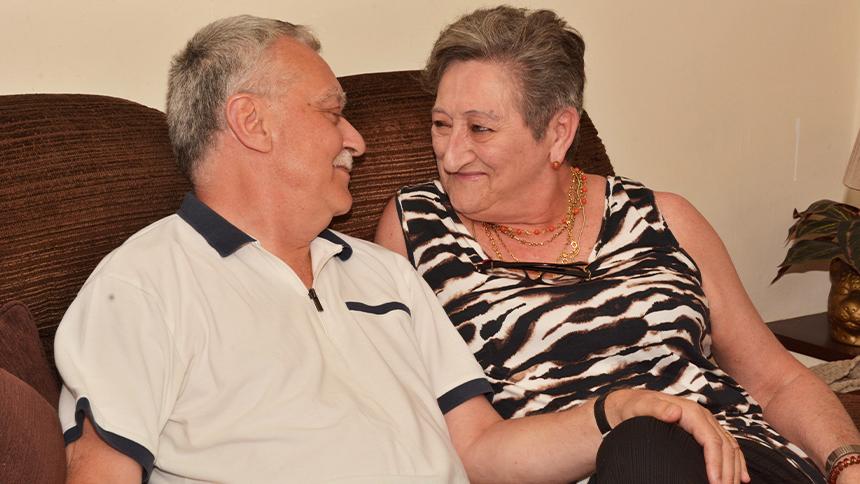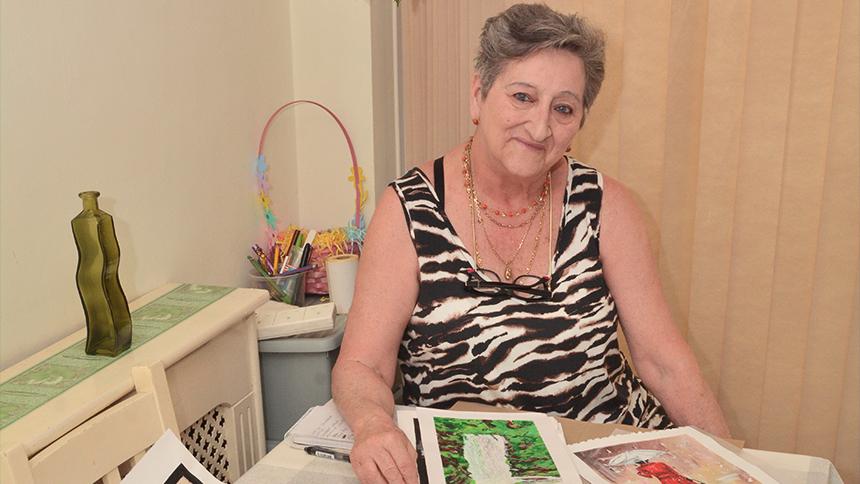
Real stories
Accepting my dementia diagnosis and focusing on what I enjoy
Maria, in Essex, doesn’t shy away from what she’s lost since her dementia diagnosis, but she’s determined to use her creativity and her voice.
When she was asked by her local council to design a logo for dementia support, Maria created a beautiful trio of forget-me-nots.
She included new shoots on the image to represent the help and new paths that can spring up for people with dementia.
Those new shoots could also symbolise Maria’s own impact. Now 69, she has found ways for her own special brand of positivity to reach far and wide.
New paths and new purpose
Maria and her husband Norman volunteer with Time for Dementia. Through this, they help educate healthcare students about what life is truly like for people affected by dementia.
Maria has also discovered a new hobby – one that was far from her thoughts before she was diagnosed with vascular dementia 15 years ago.
In her living room, surrounded by paper and acrylics, she paints beautiful pictures. She donates many of them to hospital wards to showcase the talents that people with dementia can develop.
Maria has been involved in her Dementia Voice local group too.
The group explains what businesses and organisations need to do to become more accessible for people with dementia.
‘The changes they made have been life changing and help us live as normally as possible. They mean I can use the airport and visit my family,’ she says.
Being in this group made me feel important. It showed my voice is important. I am important.

Struggles and acceptance
Thinking back to when Norman insisted she discuss her memory problems with her GP, Maria says she didn't realise she had become forgetful.
‘I thought, “Oh, there’s nothing wrong,” but I went to make him happy and shut him up basically.’
However, she had been leaving the cooker on, leaving taps and lights on and forgetting words.
Words have always been my main struggle. The more I think about them, the more stressed I get.
‘I try to explain what the word is that I’m searching for and people don’t understand, and I struggle more.’
The GP didn’t think anything was wrong, but the couple talked to a psychologist who referred her for a memory test. After having an MRI scan, she was told she had vascular dementia.
Unusually, Maria says this didn’t have a big effect on her.
Things to look forward to
‘I have never sat in a corner thinking, “Oh God, when am I going to die?” or “What is going to happen to me?”
I just accepted it. The worst thing you can do is dwell in your miseries. That’s how life is wasted.
Two years ago, Maria was also diagnosed with Alzheimer’s disease.
‘I’ve always been a strong person,’ says Maria. ‘I’ve had a few traumas in life, but I’ve got on with it.
‘I have my kids, I have my grandkids. I’m never going to give up because I have them to look forward to.’

Patience and time
Maria was born in Gibraltar, which is where she met Norman. It’s also where her daughter, son and grandchildren live.
They only see their mum if she flies over or if they come to Essex, and it took a while for them to take in the diagnosis.
‘I find travelling very stressful now, but I want to see them as much as I can because I love them all to bits,’ she says.
Maria says Norman is a wonderful support.
Patience is very important if you are caring for someone with dementia. If we’re arguing, instead of carrying on, Norman will walk away and that will calm things down.
‘But I say to Norman, don’t assume that you know something about me. Ask me and listen to what I have to say.’
She also stresses that carers need time for themselves. Norman goes to matches at his local football club, as well as enjoying cups of tea with his friends and time in his garden.
Maria says taking this time is ‘like medicine’ to carers, meaning they can better support the person with dementia too.
‘My own cocoon’
Maria and Norman used to go to local groups for people affected by dementia. But Maria now prefers the quiet and focus of time at home.
‘I prefer to be in my own cocoon,’ says Maria. ‘I’m not a loner, I just like to be at home and paint. I don’t feel the need to be out there with all the noise in groups.’
Painting has been life-changing for Maria. She tried arts and crafts classes after she was diagnosed, and soon was painting Christmas and birthday cards, and then full-scale pictures.
Artwork seen by thousands
‘When I’m in my little corner, painting, I’m in a little world of my own,’ she explains.
I love pictures, sometimes putting my own spin on what I’ve seen other people paint, like waterfalls or vintage ladies. I always put something of me in there. If I’m painting scenery outside, I just paint what I see.

‘I show my emotions in my abstract work. I start painting and if I’m not feeling it, I stop. I have to be in the right frame of mind.’
Maria’s forget-me-nots image for Inclusive Dementia Communities in north Essex has been seen by thousands.
The logo is used to promote organisations with a good understanding of dementia – on stickers, badges, tablecloths, pop-up banners, certificates and more.
Educating future healthcare professionals
Through Time for Dementia, Maria and Norman have regular Zoom meetings with nursing and other healthcare students.
‘We talk about how to deal with us, but stress that everyone’s different.
‘They ask lots of questions, some are personal, some are not, but I don’t mind answering them. I know I’m helping people out there. We’re in our second year now and we’ve already said we’ll do next year.
‘It has a big impact on me because I can see their faces and how happy they are with the meeting.
‘One thing I tell them is, “Don’t talk to me and look at my husband. Talk to me face to face.”
‘If there’s something I don’t understand or can’t remember,
I always say, “Norman?” and he answers for me, but I don’t want to be ignored. I’ve heard many others say that too – we still have a voice.’
One of the students who saw Maria’s paintings asked to display some in dementia wards to show what a person with dementia could still do.
Losing people
Maria doesn’t shy away from talking about some of the difficulties dementia has brought. As an outgoing person, she used to have a lot of friends.
‘Since I was diagnosed, little by little they dropped away,’ she says. ‘Then I made a lot of new friends by going to the dementia groups. I called that my little family. But this hurts me to say – they are dying. I’m losing them because of an illness.
‘That’s maybe part of why I don’t go to groups anymore. I don’t want to get attached to people.
‘All these years I’ve been diagnosed, and these people I’ve known for a few years have died before me. How can that be? I can’t understand it and I feel guilty.’
Focus on joy
Maria focuses on things she enjoys – getting on with life, going out with Norman and traveling while she can.
‘I am no longer a party animal. I’ve grown older now. Being at home is what I want to do.
‘I have leg problems and back problems, and use a stroller or a walking stick or a wheelchair, but I can still have a laugh and a joke. I am at home, acting my age!’
Despite her painful experiences, the couple advise everybody who’s recently been diagnosed to attend every group they can and meet as many people as they can. This can help in many ways.
‘Have a life. Have a good life,’ she says.
Realise that life is going to change, but you can make it change for the better.
How can you help?
Your donation helps us to support more people like Maria to remain as independent as possible.

